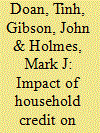|
|
|
Sort Order |
|
|
|
Items / Page
|
|
|
|
|
|
|
| Srl | Item |
| 1 |
ID:
130054


|
|
|
|
|
| Publication |
2014.
|
| Summary/Abstract |
There is an ongoing debate about whether microfinance has a positive impact on education and health for borrowing households in developing countries. To understand this debate, we use a survey designed to meet the conditions for propensity score matching (PSM) and examine the impact of household credit on education and healthcare spending by the poor in peri-urban areas of Ho Chi Minh City, Vietnam. In addition to matching statistically identical non-borrowers to borrowers, our estimates also control for household pre-treatment income and assets, which may be associated with unobservable factors affecting both credit participation and the outcomes of interest. The PSM estimates show a significant and positive impact of borrowing on education and healthcare spending. However, further investigation of the effects of the treatment reveals that only formal credit has a significant and positive impact on education and healthcare spending, while informal credit has an insignificant impact on spending. This paper contributes to the limited literature on peri-urban areas using evidence from one of the largest and most dynamic cities in Southeast Asia.
|
|
|
|
|
|
|
|
|
|
|
|
|
|
|
|
| 2 |
ID:
128855


|
|
|
|
|
| Publication |
2014.
|
| Summary/Abstract |
The impact of inequality on the outbreak of intrastate armed conflicts or civil wars has recently attracted considerable interest in conflict research. In contrast to previous studies that have focused on inequality in the total population (vertical inequality), recent studies have analysed inequality between certain groups of people (horizontal inequality), and found that inequality significantly increases the likelihood of conflict onset. However, most of the recent studies on the inequality-conflict nexus have focused on conflicts fought between ethnic groups. The relation between inequality and other (non-ethnic) categories of conflicts has attracted less attention. The present study aims to address this gap: it implements a theoretical and empirical analysis of the relation between inequality and popular rebellions, a subset of conflicts where mobilization transcends ethnic boundaries and hostilities involve popular participation. Based on a sample of 77 popular rebellions and new global data on vertical inequality in income and education, this study shows that inequality significantly increases the likelihood of popular rebellion onset. In addition, the study reveals that inequality proxies (income and education Gini indices) outperform proxies of the absolute level of income (GDP per capita) in the model of popular rebellion onset, suggesting that it is relative, not absolute, well-being that ultimately motivates people to rise up in arms.
|
|
|
|
|
|
|
|
|
|
|
|
|
|
|
|
| 3 |
ID:
132596


|
|
|
|
|
| Publication |
2014.
|
| Summary/Abstract |
Due to government subsidies, Brazil has witnessed an increase in the installation and use of small solar water heating systems in low-income housing projects. Although the initiative has reduced the load curve during peak times due to the reduced use of electric showerheads, measurement and verification (M&V) are needed to validate the savings. M&V procedures should take into account the social and economic variability of low-income housing developments. To improve M&V in low-income housing projects, this paper presents a methodology for identifying homogeneous subgroups based on their energy-saving potential. This research strategy involved a cluster analysis designed to improve the understanding of what energy savers and other influencing factors exist. A case study in Londrina Brazil was undertaken with 200 low-income families. Five clusters, created based on savings potential, were defined. The results showed that only two clusters demonstrated good electricity savings, representing 47% of families. However, two clusters, or 37%, did not provide satisfactory savings, and the other 16% did not provide any consumption history due to previous use of illegal city electricity connection practices. Therefore, studies confirm the need for a detailed measurement of the representative subgroups to assess the influence of human behaviour on potential SWHS-induced savings.
|
|
|
|
|
|
|
|
|
|
|
|
|
|
|
|
|
|
|
|
|